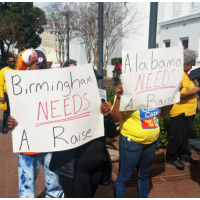Birmingham Officials Claim Discrimination by White Lawmakers in Minimum Wage Restriction
 Credit: Raise Up for 15
Credit: Raise Up for 15
By Dan McCue, Courthouse News Service
White GOP state lawmakers in Alabama blocked the Birmingham City Council from raising the minimum wage for its mostly black population, a lawsuit claims.
In a federal complaint filed on Thursday, the NAACP, Greater Birmingham Ministries, and two black fast-food workers, claim the state lawmakers have repeatedly pre-empted any local regulation of matters touching upon private sector employment.
In August 2015, Birmingham’s mayor and city council decided to increase the minimum wage for those employed within the city’s borders from the federally-mandated $7.25 per hour to $10.10 per hour. At the time, the complaint says, City Council President Johnathan Austin said in adopting the ordinance “We’re just trying to do what we think is best for our citizens and our workers.”
The city attorney was even more succinct, telling a local reporter, “We can’t have a progressive city and low-wage jobs.”
Birmingham is the largest municipality in Alabama and about 74% of its population is black.
Of those residents, about a third have earnings below the federal poverty level, and most earn under $16,000 a year.
“All those with earnings below the poverty level, as well as others, would have benefited by implementation of the minimum wage ordinance,” the complaint says.
According to the plaintiffs, after the local ordinance was adopted, several white legislators – long “deliberately unresponsive and openly hostile to the economic needs of minorities” – proposed a bill in the legislature that would nullify the Birmingham minimum wage law.
Because the 2015 bill was proposed during a special session of the legislature, lawmakers could not act on it.
However, when they returned for this year’s session, revoking Birmingham’s minimum wage ordinance was their first order of business.
“The passage of a statute abrogating Birmingham’s ‘minimum wage’ ordinance is the most recent example of the State Legislature denying a predominantly African-American local government and its residents of the right to determine what is best for their community,” the complaint says.
“In its haste to override Birmingham’s minimum wage ordinance, the Legislature disregarded even the very limited procedural protections that existed against State intrusion into local affairs,” the complaint continues. “In uncharacteristic fashion, and contrary to its normal practices, the State Legislature passed the so-called ‘Alabama Uniform Minimum Wage and Right To Work Act’ (hereinafter HB 174) in a little over a week after its first reading and the Governor signed the bill within two hours after it reached his desk.”
The plaintiffs say these actions denied them their rights to equal protection under the law.
Further, they say, despite the passage of the federal Voting Rights Act, blacks have still not been able to elect officials on the state level that are responsive to their needs.
The plaintiffs contend the state legislature’s decision to nullify Birmingham’s minimum wage ordinance was racially motivated and that this legislation disproportionately affects black residents of Birmingham who work in the city.
They also maintain the legislature’s nullification of Birmingham’s ordinance relies on the 1901 state constitution’s concentration of power at the state level and its denial of local autonomy.
They claim the delegates who drafted and ratified the 1901 constitution did so expressly to deny blacks control over matters of local concern.
Finally, the plaintiffs say, the pre-emption of any and all ordinances or regulations related to private sector employment uniquely burdens predominantly black communities.
They seek declaratory and injunctive relief.
To Learn More:
Grand Gesture from Alabama Governor to Open DMV Offices 1 Day per Month Does Little to Quell Voter Outcry over Closures (by Noel Brinkerhoff and Steve Straehley, AllGov)
Supreme Court Votes 5-4 that Alabama’s Redistricting is Unfair to Black Voters (by Steve Straehley, AllGov)
In No State can a Minimum Wage Worker Afford a One-Bedroom Rental for Fewer than 49 Hours of Work a Week (by Steve Straehley, AllGov)
- Top Stories
- Unusual News
- Where is the Money Going?
- Controversies
- U.S. and the World
- Appointments and Resignations
- Latest News
- Musk and Trump Fire Members of Congress
- Trump Calls for Violent Street Demonstrations Against Himself
- Trump Changes Name of Republican Party
- The 2024 Election By the Numbers
- Bashar al-Assad—The Fall of a Rabid AntiSemite






Comments